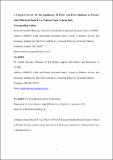| dc.contributor.author | McGregor, Caroline | |
| dc.contributor.author | Devaney, Carmel | |
| dc.contributor.author | Moran, Lisa | |
| dc.date.accessioned | 2019-03-05T12:13:31Z | |
| dc.date.issued | 2019-02-14 | |
| dc.identifier.citation | McGregor, Caroline, Devaney, Carmel, & Moran, Lisa. (2019). A Critical Overview of the Significance of Power and Power Relations in Practice with Children in Foster Care: Evidence from an Irish Study. Child Care in Practice, 1-15. doi: 10.1080/13575279.2018.1555135 | en_IE |
| dc.identifier.issn | 1476-489X | |
| dc.identifier.uri | http://hdl.handle.net/10379/15005 | |
| dc.description.abstract | This paper is based on findings from an Irish study of permanence and stability outcomes for children in long-term care which involved biographical narrative interviews with 27 children, young people, parents and foster carers. The study concluded that power and power relations featured significantly in the narratives of our interviewees. To advance guidance for practice, this paper aims to build on the findings of the study reported with an emphasis on the theorisation of power and power relations to inform practice. To do this, we use illustrative quotes from children, young people and their families to demonstrate how power markedly affected their experiences. The findings are considered in the context of an adapted version of Bronfenbrenner s ecological model with a focus on the interaction between the social work system and individual social workers (exo system) the young person and their wider family (micro-meso- system) as perceived by the latter. The wider impact of policy (macro system) and transitions and experiences over time (chrono-system) are considered in the context of this interaction. In the discussion, the need for more explicit studies of power and power relations within the context of an ecological model to f capture the complexity of layers and interactions of each child s social system is highlighted. The contribution and limitation of the research is discussed. We end with a commentary about the importance of promoting an increased voice for children and young people in the development and improvement of public child welfare services. | en_IE |
| dc.description.sponsorship | Research was carried out on behalf of the Child and Family Agency, Tusla with teams from two counties in Ireland. Special Thanks to Principal Social Workers Nora Roarty and John Leinster and their teams for their participation in this study. | en_IE |
| dc.format | application/pdf | en_IE |
| dc.language.iso | en | en_IE |
| dc.publisher | Taylor & Francis | en_IE |
| dc.relation.ispartof | Child Care In Practice | en |
| dc.rights | Attribution-NonCommercial-NoDerivs 3.0 Ireland | |
| dc.rights.uri | https://creativecommons.org/licenses/by-nc-nd/3.0/ie/ | |
| dc.subject | Children’s rights | en_IE |
| dc.subject | Fostering | en_IE |
| dc.subject | Practice | en_IE |
| dc.subject | Power | en_IE |
| dc.subject | Young people in care | en_IE |
| dc.title | A critical overview of the significance of power and power relations in practice with children in foster care: evidence from an Irish study | en_IE |
| dc.type | Article | en_IE |
| dc.date.updated | 2019-03-01T14:54:48Z | |
| dc.identifier.doi | 10.1080/13575279.2018.1555135 | |
| dc.local.publishedsource | https://doi.org/10.1080/13575279.2018.1555135 | en_IE |
| dc.description.peer-reviewed | peer-reviewed | |
| dc.description.embargo | 2020-02-14 | |
| dc.internal.rssid | 15946864 | |
| dc.local.contact | Carmel Devaney, Unesco Child & Family Research C, Political Science & Sociology, , Nui Galway. 5733 Email: carmel.devaney@nuigalway.ie | |
| dc.local.copyrightchecked | Yes | |
| dc.local.version | PUBLISHED | |
| nui.item.downloads | 455 | |


